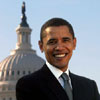Media’s performance during campaign was inadequate
Journalism Chair Tony Pederson says the media failed miserably in reporting on the Obama and McCain campaigns.

By TONY PEDERSON
Sen. Barack Obama is now president-elect, riding a wave of what has been widely perceived as soft treatment from the mainstream media. Major academic analyses of bias — both real and perceived — already are under way. Everything will be sliced and diced for research, from major newspapers to the evening news to “Saturday Night Live” and the late-night talk shows.
 Tony Pederson |
Measuring her own newspaper’s coverage, Washington Post ombudsman Deborah Howell has concluded that Obama received much kinder treatment than did Sen. John McCain on both the news and editorial pages. The Project for Excellence in Journalism concluded the same for news coverage on a national scale.
But Howell also noted the relatively low number of stories her paper carried that dealt with serious issues and analysis, as opposed to “horse race” stories. We don’t need academic research to tell us the media performed very poorly in telling the American public about the candidates and the issues in the presidential campaign just concluded.
We have become habitues of the ubiquitous and instantaneous Internet. We are accustomed to bloggers breaking news stories that mainstream media either overlook or can’t get. We are numbed by the shrillness of bloggers both on the far left and the far right. Unfortunately, the mainstream media seem more influenced by the Internet than vice versa.
The New York Times stands accused of carrying its editorial endorsement of Obama onto the news pages. A major Times investigative piece in February that described McCain as being too close to a female lobbyist as well as an unflattering piece on Cindy McCain that ran closer to the election are frequently cited as evidence.
On the other side, Fox News, the highest-rated cable news channel, hammered on voter registration tactics and ongoing investigations of ACORN as well as Obama’s relation with Chicago neighbor and former domestic terrorist William Ayers.
At our country’s founding, the press was expected to be stridently partisan and pursuing of its own self-interests, and it has been succeeding in spades lately. Anything goes.
But here are the real questions for the media about this past election and the next: Where is the news and serious analysis of what lies ahead? Why is there so much probing of the past, much of it immaterial? Why are we still so caught up in gotcha journalism?
Both candidates had Web sites with major policy positions on the economy, taxes, foreign policy, health care reform, free trade and education. But there was scant serious analysis of these positions in the mainstream media. Both candidates proposed major economic and health care reforms, but mainstream media did little to point out the pie-in-the-sky aspects of their plans.
Obama was never seriously challenged on his early campaign promises to “renegotiate NAFTA” or on his wildly inaccurate statements about violence in Colombia, let alone how he intends to create the promised substantial job growth. McCain was never made to explain how he would balance the budget while dealing with an economic crisis and funding a continued war in Iraq in the face of a dominant Democratic majority in Congress. Neither candidate ever really addressed these major issues: how to continue paying for entitlements such as Medicare, Medicaid and Social Security.
The media landscape has not been a complete wasteland. In the past year, Peggy Noonan emerged as a fresh and elegant weekly columnist for The Wall Street Journal. She noted Sen. Hillary Clinton’s character flaws and burdensome campaign issues long before they led to her failed run for the Democratic nomination. And it was Noonan, a conservative, who spotted the McCain instincts that would ultimately betray him and explained why Gov. Sarah Palin was a throwaway choice for his vice president.
There are a few other isolated examples of excellence. But why have newspapers, overall, lost the intellectual foundation and voice that once framed news coverage, editorial positions and analysis? Is it coincidence that the more newspapers read and look like Facebook, the more their circulations sink? Why have the networks become so irrelevant in terms of actually breaking news stories as well as serving the agenda-setting function of years past?
To be sure, newspapers are suffering economic issues and cutbacks in reporting staff never imagined when the Internet was first becoming a factor. The explosion of cable television channels and resulting audience fragmentation continue to change the face of television in both news and entertainment. The Internet tugs at the social and communications fabric of our culture.
But here are a few survival tips for mainstream media: Cut the shrillness. Leave the gossip to the bloggers. Give us facts and coherent and thoughtful analysis. Deliver on that other expectation our Founding Fathers had for the press: Be our government watchdog. And most of all, don’t rehash a stale past. Help us understand the future.
• Tony Pederson, a former executive editor of The Houston Chronicle, is professor and Belo Distinguished Chair in Journalism at Southern Methodist University in Dallas.